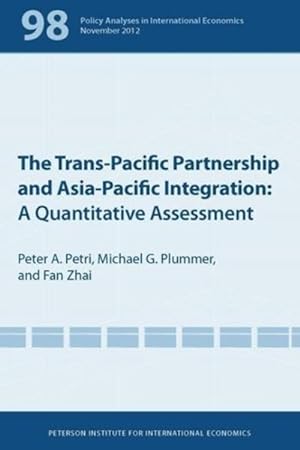Inhaltsangabe
"While global trade negotiations remain stalled, two tracks of trade negotiations in the Asia-Pacific--the proposed Trans-Pacific Partnership (TPP) agreement and a parallel Asian track--could generate momentum for renewed liberalization and provide pathways to region-wide free trade. We estimate that world income would rise by $295 billion per year on the TPP track, by $766 billion if both tracks are successful, and by $1.9 trillion if the tracks ultimately combine to yield region-wide free trade. The tracks are competitive initially but their strategic implications appear to be constructive: they generate incentives for enlargement and mutual progress and, over time, for region-wide consolidation. The "21st century" template of the TPP would be especially productive because it is likely to offer opportunities for the leading sectors of both emerging-market and advanced economies. An ambitious TPP template would generate greater gains from integration than less demanding alternatives, but it will be harder to sell to China and other key regional partners as the TPP evolves toward wider agreements. The crucial importance of Asia-Pacific integration argues for an early conclusion of the TPP negotiations, but without jeopardizing the prospects for region-wide or even global agreements based on it in the future"--Provided by publisher.
Über die Autorin bzw. den Autor
Peter A. Petri, visiting fellow at the Peterson Institute for International Economics, is the Carl J. Shapiro Professor of International Finance in the International Business School of Brandeis University and a senior fellow of the East-West Center. From 1994 to 2006, he served as the founding dean of the International Business School. He has held appointments as visiting scholar or professor at the Organization for Economic Cooperation and Development (OECD), Keio University, and Fudan University, and as Fulbright Research Scholar and Brookings Policy Fellow. He has consulted for the Asian Development Bank, the Asian Development Bank Institute, the World Bank, the OECD, the United Nations, and the governments of the United States and other countries. He is active in US-Asia affairs and is a member of the Board of the US Asia Pacific Council, the International Advisory Group of the Pacific Economic Cooperation Council (PECC) Trade Policy Forum, and the International Steering Committee of the Pacific Trade and Development Conference Series (PAFTAD).
Michael G. Plummer is the Eni Professor of International Economics at Johns Hopkins University, SAIS Bologna. He is also editor-in-chief of the Journal of Asian Economics and (nonresident) senior fellow at the East-West Center. He was head of the Development Division of the Organization for Economic Cooperation and Development (2010-12), the associate professor of economics at Brandeis University, and director of its MA programs at the International Business School. He was also a Fulbright Chair in Economics; Pew Fellow in International Affairs, Harvard University; research professor at Kobe University; and visiting fellow at ISEAS, the University of Auckland, and Doshisha University. Plummer has worked on numerous projects for international organizations, development and other government agencies, and regional development banks, including the Asian Development Bank (ADB), the Association for Southeast Nations (ASEAN) Secretariat, and the ADB Institute.
Fan Zhai is managing director and head of the asset allocation and strategy research department of the China Investment Corporation (CIC). He is responsible for overall asset allocation strategy and portfolio management of CIC's overseas investment. He also oversees macroeconomic research and market analysis to support strategic asset allocation and tactical investment views. Before he joined CIC in November 2009, he was research fellow at the Asian Development Bank in Manila. He has also worked at the Ministry of Finance and the Development research Center of the State Council in China.
„Über diesen Titel“ kann sich auf eine andere Ausgabe dieses Titels beziehen.
